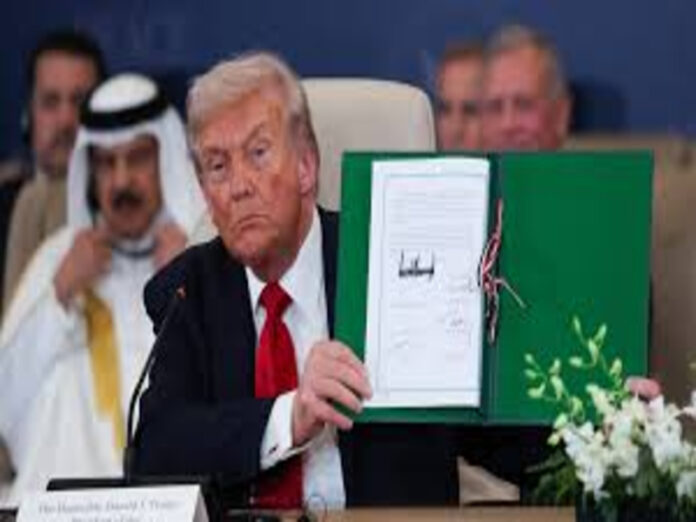“Historic Agreement Ends Years Of Bloodshed, Opening A Path To Reconstruction & Regional Stability.”
Monday, October 13, 2025, 1:45 P.M. ET. 4 Minute Read, By Jennifer Hodges, Ryan Metz, & Art Fletcher: Englebrook Independent News,
SHARM EL SHEIKH, EGYPT- In what may prove to be one of the most consequential diplomatic milestones of the 21st century, President Donald J. Trump on Monday signed the Gaza Peace Plan, marking the formal start of a phased pathway to end the war in Gaza and lay the groundwork for a lasting peace in the Middle East.
The signing ceremony, hosted by Egyptian President Abdel Fattah el-Sisi and attended by delegates from over two dozen nations, symbolized a renewed commitment to regional stability. The agreement caps years of intermittent fighting and shattered ceasefires, now replacing them with a structured international framework to end hostilities and begin reconstruction.
What The Peace Plan Contains;
Trump’s 20-Point Gaza Peace Plan, unveiled late last month, outlines a detailed process for reconciliation and reconstruction. Key provisions include:
- A mutual ceasefire between Israel and Hamas, effective immediately.
- Release of all remaining hostages held by Hamas in exchange for thousands of Palestinian detainees from Israeli prisons.
- A phased Israeli withdrawal from major population areas of Gaza, transferring control to an internationally supervised transitional authority.
- Deployment of a multinational stabilization force, led by U.S., Arab, and European partners, to prevent renewed violence.
- Creation of a technocratic interim administration in Gaza to coordinate reconstruction and governance, with an eventual transition to elected Palestinian leadership.
- Conditional steps toward final-status issues, such as demilitarization of armed factions and mutual recognition milestones.
While the Peace Plan represents a diplomatic breakthrough, challenges loom. Analysts caution that Hamas has yet to commit fully to disarmament, and questions remain over how the transitional authority will function and for how long.
Global and Regional Reactions;
In Jerusalem, President Trump declared that “the war is over,” calling the moment “a new dawn for peace and prosperity across the Middle East.” Israel’s Knesset gave him a standing ovation as he addressed lawmakers and families of freed hostages, many in tears.
In Gaza City, residents greeted the news with cautious hope. “We want peace, we want life again,” said one local teacher, surveying the ruins of her neighborhood. Aid groups have already begun mobilizing for reconstruction as the ceasefire takes effect.
World leaders broadly welcomed the accords. The United Nations called it “the most substantive peace effort in a generation.” European and Arab governments pledged financial and logistical support for rebuilding, though many urged transparent oversight to ensure accountability and human rights protection.
Still, skepticism persists. French scholar Jean-Paul Chagnollaud noted that “the plan’s ambiguities on governance could undermine its legitimacy if Palestinian representation is not clearly defined.” Others warned that militant spoilers or political hardliners could derail progress if commitments falter.
The Road Ahead;
For all its symbolism, the success of the Gaza Peace Plan will depend on implementation. Among the most urgent priorities:
- Disarmament and Security Control — Preventing a resurgence of armed factions.
- Governance Legitimacy — Ensuring the transitional administration operates transparently and earns local trust.
- Humanitarian Relief and Reconstruction — Rebuilding homes, infrastructure, and essential services in one of the most devastated areas on Earth.
- Long-Term Political Stability — Creating the conditions for sustainable coexistence and eventual Palestinian self-determination.
If these steps succeed, the accord could redefine regional diplomacy, expanding on the foundations of the Abraham Accords and setting a precedent for wider normalization between Israel and the Arab world.
A Historic Moment;
For decades, Middle East peace has eluded successive U.S. presidents, from Eisenhower to Obama and to Biden. The Gaza Peace Plan now places Trump in rare company among world leaders credited with brokering a viable end to the protracted conflict. Whether this new chapter holds will depend not on signatures alone, but on the will to uphold them.
“You’ve won. Now it is time to translate these victories into the ultimate prize, peace and prosperity for the entire Middle East.”
President Donald J. Trump, addressing Israel’s Knesset, October 13, 2025.
Editor’s Note:
President Donald J. Trump is now the only American president in nearly a century to successfully broker a comprehensive Middle East peace accord that includes Israel and its regional adversaries. While the durability of the Gaza Peace Accords remains to be tested, the diplomatic achievement marks a singular milestone in modern U.S. foreign policy.
© 2025 Englebrook Independent News. All rights reserved.
Written by Jennifer Hodges with Ryan Metz gathering from Cairo, Jerusalem, and Washington.
Edited by Art Fletcher, Englebrook Independent News.
Reproduction or redistribution of this material without written consent is strictly prohibited.


